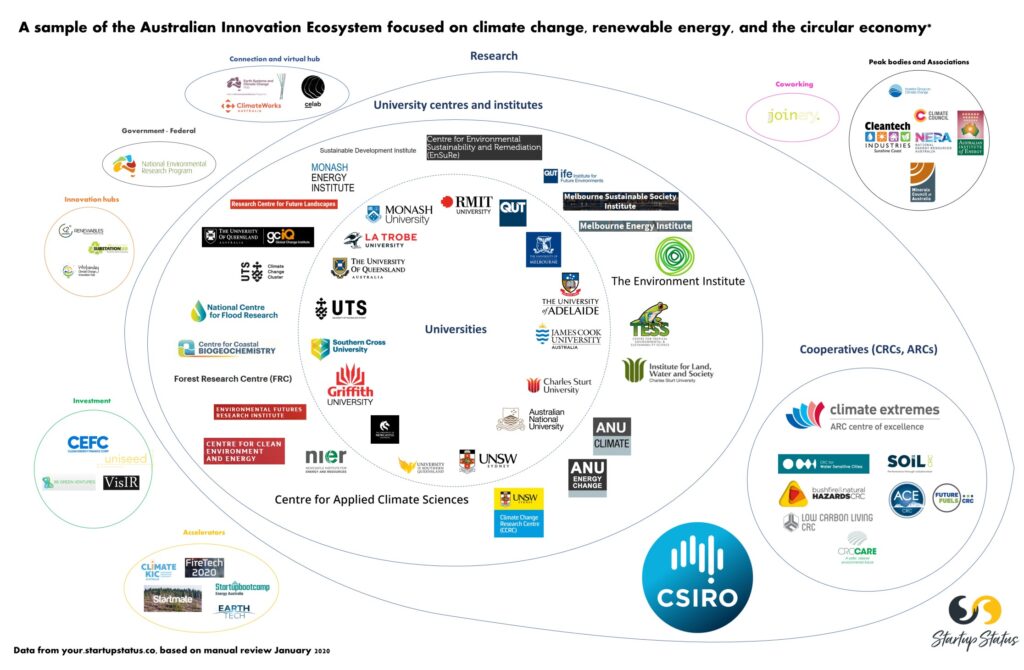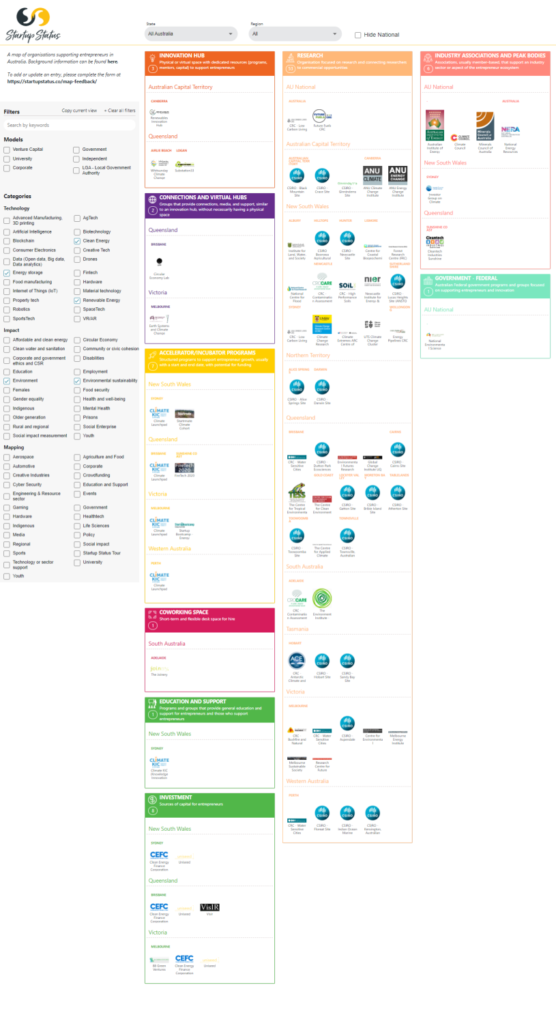The Australian innovation ecosystem focused on climate, renewable energy, and circular economy
“It has been argued that the next global wave of innovation will be about maximising resource efficiency and minimising waste and pollution in the consumption-production cycle. Recent research suggests that both climate change (and associated risks) and inadequate investment in innovation (particularly R&D) are the two highest rated risks to Australia’s future prosperity in terms of both expected severity and likelihood of occurrence. Combining these two national risks together there is a strong argument for increasing and sustained investment in eco-innovation.”
The statement above is the position of the Australian government from the 2013 Australian Innovation System Report in the chapter dedicated to “Eco-innovation in Australia”. Seven years later and the business and social case is as strong as ever.
The global narrative on climate impact is dominant and polarising. Debates focus on the cause and extent of change, but no one can argue the cost. Even as I write this post, Australia is burning with a rising and tragic cost of loss of land, property, and life. The fires are part of an overall suite of climate-related events including storms, floods and drought. The impact is the long-term survivability of species as well as short-term economic cost in the billions from insurance claims, primary industry transformation, and tourism loss.
It can be a challenge to know how to support or where to take action when the nation is in crisis. Volunteer firefighters work around the clock, donation portals are available for financial support, and social media advocates make the case for action. But creating lasting change can feel out of reach.
But there is always an opportunity for people to give it a go.
A map of support for environment-focused entrepreneurs
Thankfully, there is a support network in Australia made up of academic, government, investor, corporate, and other private organisations focused on climate and environment-related entrepreneurs. The map below provides options for those who have an idea to take action, or want to help others who are keen.

The map above will be out of date as soon as this post is published and the feedback comes in to add other roles. You can access the up to date digital version with links on the live map at your.startupstatus.co.

The usual conditions apply, similar to other maps of support for female entrepreneurs and creative industries.
- The focus is on climate, renewable energy, and circular economy. This remains broad but we wanted to focus within the broad topic of environmental sustainability which includes the number of agriculture and resource sector support actors. There are also accelerators focused on social enterprises in general, but we limited the discussion here to dedicated climate action. As with any ecosystem segmentation, the boundaries are blurry and we welcome discussion.
- The map is indicative but not complete. We had dozens of actors each week and occasionally do deep-dives into segments such as this one on climate, but there will always be others we missed, many embarrassingly obvious. Peak bodies is especially light. No offence is intended by the omission. Part of the reason for posting is to raise awareness and collectively build the map through community. Your feedback on adjustments is welcome.
Research
Research is dominant. An explanation for this is that climate change is complex, involves many global diverse stakeholders, change takes a long time to realise outcomes, and requires significant policy action and advocacy.
There is a project underway to add all university institutes and centers to the map. The intent is to ensure entrepreneurs in startups and established businesses in a given field have access to the latest Australian research. We pulled an early cut for this map to identify centres related to climate change.
This is subjective. For example, there are many centres focused on agriculture and regional sustainability. But we limited the map to those where the focus was on climate-related impacts. This was based on a desktop review of websites and we are open for the case to be made for others to be included.
Cooperative Research Centres (CRCs) is a federal program that brings together stakeholders for a short-term focus on significant challenges. There is also the CLimate Extreme Centre of Excellence. Similar to university centres, we identified CRCs related to climate impacts.
Finally, several of the CSIRO locations focus on climate-related impacts, and we have tagged the relevant locations.
Peak bodies and associations
Many peak bodies have statements relating to climate change and are in a position to advocate on behalf of their members. The map is still building the list of Australian peak bodies, so we expect there may be others. A few examples are listed in the map.
Coworking
The Joinery in South Australia in included based on a stated focus on sustainability and evidence of programs and events focused almost exclusively on the topic.
Connection and virtual hubs
The Circular Economy Lab is a collaboration between consultants Business Models Inc and Coreo, bringing together diverse stakeholders to focus on circular economy projects.
ClimateWorks Australia was developed out of the Monash University Sustainable Development Institute and brings experts together around solutions to climate-related challenges.
The federal government National Environmental research Program created several focused collaborative project hubs, including the Earth Systems and Climate Change hub. The hub is pulling together the Climate 2020 conference in Australia in November 2020.
Innovation hubs
ACT’s Renewables Hub was funded by the Renewable Energy Innovation Fund (REIF), as part of the ACT Government industry development strategy to grow the renewable energy ecosystem in the Territory and is currently in transition.
The Whitsunday Regional Council’s climate change hub brings together stakeholders to focus on climate issues, using the local natural environment as a case study.
Substation33 in Logan, Queensland focuses on innovation in ewaste, recycling, and sustainability, developing global startups and engaging government, industry, and research.
Accelerators
ClimateKIC’s Climate Launchpad program provides mentoring and support and access to a global opportunity for scale.
Sydney tech accelerator Startmate is running a climate-focused cohort in 2020 with access to specialised funds, mentoring and networks.
Noosa Council’s Peregian Hub is delivering a new FireTech accelerator in 2020 focused on technologies related to predict, prevent, fight or manage bushfire emergencies. The hub is also hosting the EarthTech challenge that invites purpose-driven young people aged between 13-29 to help solve the world’s most pressing environmental and social issues.
Energy Australia delivers an energy-related startup bootcamp for innovative startups solving problems in Energy Efficiency, Energy Independence, Digitisation, and Analytics.
The Australian Technologies Competition is delivered by ImpactTech Ventures with an emphasis on addressing social and environmental challenges through global connections.
Investment
Many of the available investment funds in Australia would support a viable business related to climate change. There are a few funds, however, that mention a specific mandate related to environmental impacts including energy-related projects. These include Uniseed, VisIR, and the Clean Energy Finance Corporation. There are likely others, and we are uncertain as to whether all the funds are currently active.
A map for action
The purpose for developing what has turned into a small research project is to raise awareness for those who want to collaborate and take action. The map highlights a few opportunities:
- Collaboration: Not only are there opportunities within the individual programs, there is also an opportunity for greater collaboration between programs to pool resources. Accelerators have opportunities to integrate with research bodies. Investors can support commercialisation of research projects. Innovation hubs can position to bring actors together.
- Support current programs: If you are moved by climate change, engaging with any of the actors on the map to support and be involved would be a great start.
- Find the gaps: Mapping shows what is there as well as what is missing. If there is a gap that needs to be filled, consider what can be done with what you have available.
- Share and contribute: Pass this post on if you know someone who wants to take action or is already involved in supporting entrepreneurs focusing on climate and environmental matters. Please let us know is there are roles that need to be added.
The impacts from the recent fires and other climate-related events are devastating. Yet in crisis comes inspiration and innovation to address complex and global challenges. The depth of the tragedy means there is no better place to work with like-minded people to make global change. The growing entrepreneur support network is available to help.
